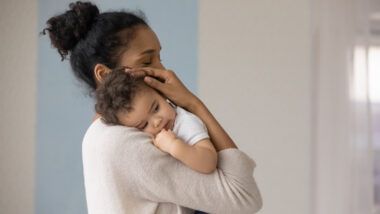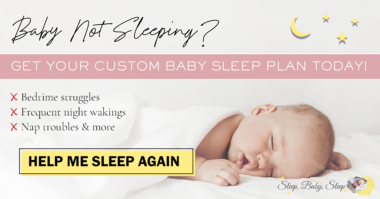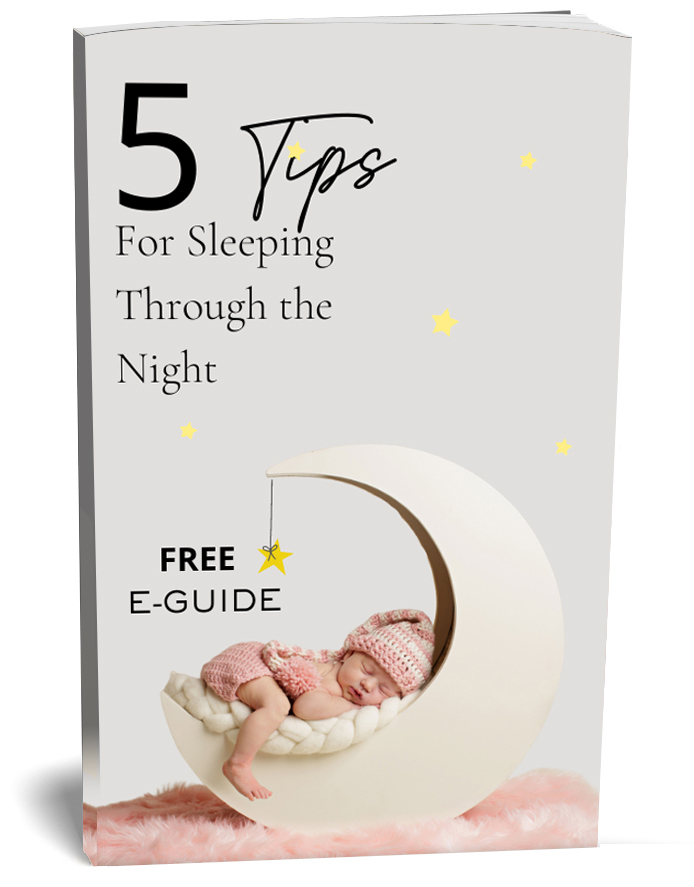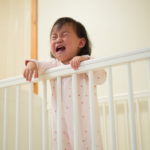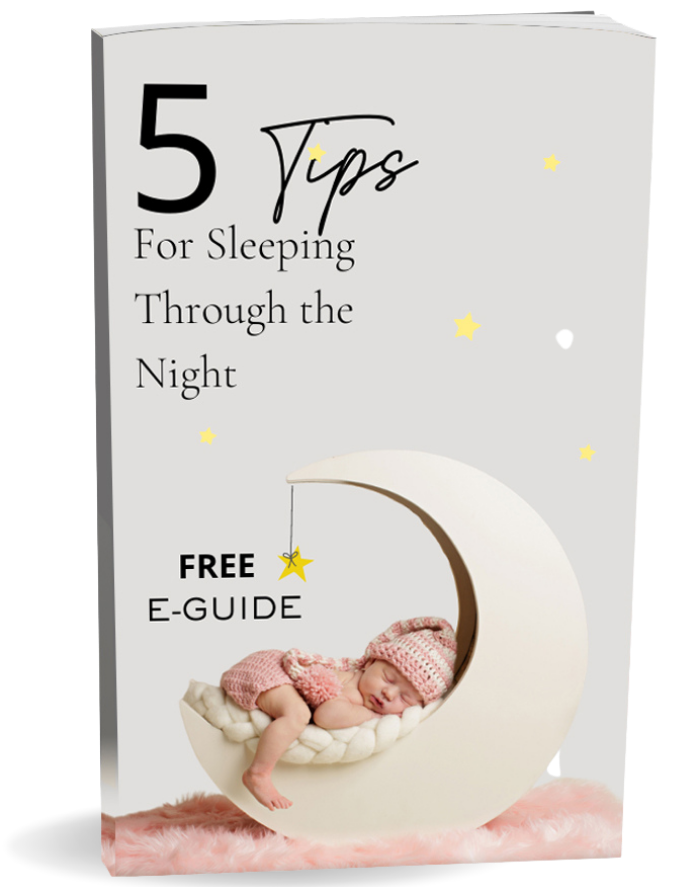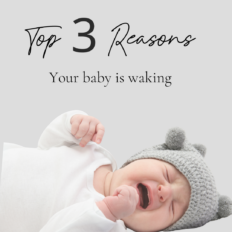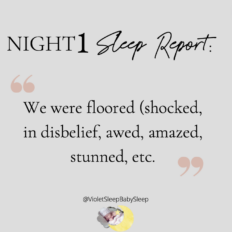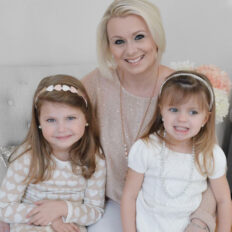Is Sleep Training Necessary for Your Baby?
The 5 MOST IMPORTANT Signs
Ahh, that super-sleeper. The baby who gives you that cute little lopsided smile before she drifts off to slumberland in her cozy crib. The sweet bundle you won’t be hearing from for another six to eight hours. Don’t you love her?
Perhaps you’re thinking, “Never met her.”
Well, it’s time you did! Once upon a time, I thought I’d never meet that baby either, much less have the joy and pleasure of raising a contented, easy sleeper. In fact, at first, my beautiful and talented daughter was as helpless as I was as to how to get her to fall asleep easily.
But I found the answers, and they’re easier than you think.
Is Sleep Training Necessary for Every Baby?
No. Many babies cork right off without a problem. Your baby’s physiology is designed to start maturing her into adult-like sleep patterns as early as 3-5 months. And even before that time, the hormones a baby begins producing, including melatonin, should be helping him to feel sleepy when it’s dark out, and awake when it’s daytime.
On the other hand, my guess is that if you’re reading this article, your baby isn’t among those “easy sleepers.” Don’t worry –– he can be. He just needs the right, gentle sleep training.
Curious about sleep training? Let’s talk! Contact me here.
How I Found Out Sleep Training Was Necessary for Us
During my research years ago, I found out that it isn’t natural for a baby to have trouble drifting off in the crib or cradle.
The problem is, the advice we’re so often given by well-meaning friends can actually lead to more, not fewer, wakings. Once you know the signs of slipping sleep habits and how to change them, you’re well on your way to happy nights for everyone.
Once I honed in on the key signs that my baby needed a new approach –– one that was gentle, caring and effective –– she did become that gurgling, smiling super-sleeper. It wasn’t always easy, but the results were worth it…and she never had to cry it out, feel abandoned, or be frightened.
It’s About Quality, Not Just Quantity
Some parents try to make up for their baby’s (and their own) lost nighttime sleeping with frequent daytime naps, or extra-long ones. And I don’t blame them.
The problem is, it’s not enough for your baby to nap more during the day. Your baby isn’t getting that one extra-long slumber everyone needs, even babies. And this lack of quality sleep can interfere with your child’s development.
This is how it happens. There are several stages of sleep. During the deepest periods of sleep, tissue repair amps up, and key growth hormones are released in your baby’s body.
But this deep stage takes the longest to get to. So if your baby’s sleep is interrupted by fully waking, her body may not be getting to that place of growth and repair for long enough.
Five Signs Sleep Training is Necessary
Through my years working as a Certified Sleep Consultant, I have pinpointed 5 key signs to look for that sleep training is necessary for your baby.
If you see these in your little one, it may be time to gently teach her how to self-soothe. (Overwhelmed? Help is here! Contact me right now to set up a sleep consultation.)
#1: Your Baby Wakes Frequently at Night
Newborn babies wake around the clock, usually somewhere between every two and four hours. But after about four weeks, your baby should begin to lengthen his sleep times, especially at night, when there is less going on to keep him up.
Interestingly enough, this doesn’t mean your baby doesn’t rouse at all in the night. Babies and adults alike go through several slight wakings nightly. However, if you have healthy sleep habits, you’ll get right back to sleep again. So will a baby who has developed these same habits.
Wakings that require your intervention are usually your tip-off. If your baby wakes, fusses, and won’t settle down without your help, sleep training may be necessary.
#2: Sleep Times are a Mess
For many babies, sleep problems don’t just mean waking at night. Baby sleep troubles can take any of these forms (or a combination of them):
- Your baby falls asleep, but easily awakens at the slightest sound.
- Your baby can’t fall asleep in his crib or cradle.
- Your baby won’t nap, or his naps seem short and he wakes up irritable and tired.
- Your baby falls asleep just fine at night, but wakens with a loud cry, as if he’s frightened.
- Your baby seems frightened of her crib.
Rest times should be peaceful. I know that sounds very optimistic (and just a little bit 1950s), but it’s true. Your baby should enjoy being put down while still drowsy but not asleep. Her body is telling her to rest.
If instead your baby’s sleep times are all over the place, or if she won’t lie down for long, it can all seem like one big mess. Things tend to worsen in this way if you don’t make changes, so even the little sleep your baby gets can become unpredictable. Now you’re both irritable!
If you are struggling getting your baby to sleep either at nap time, bedtime, during the night or all of the above, then this is a good indication that your baby needs sleep training. Sleep times should be calm, enjoyable and a great time to wind down and bond with your baby. If they rarely, or never, are, that’s a key indication that sleep training has become necessary.
Important Note: Don’t worry that your baby will have to “cry it out” or that the process will otherwise be painful. It definitely doesn’t have to be! It’s important to consider your child as a unique person, and your situation as unique, too. You need a routine that’s ideal for your household. And it needs to make your child feel secure so he’ll learn to self-soothe himself to Slumberland.
Having trouble getting started? I developed a series of methods that have close to a 100% success rate. Want bedtime without tears?
TAKE A LOOK AT MY SLEEP PACKAGES AND AVAILABLE OPTIONS
Questions? Email Me Here—>
#3: Your Baby Needs a “Prop” to Get Back to Sleep
A prop is anything our little one needs in order to fall asleep. Props aren’t always bad; for example, rocking and pacifiers (binkies) can be considered props. But if your baby can’t fall asleep without her props, it’s time for sleep training.
Through my years as a Pediatric Sleep Consultant, I’ve found that sleep props are the number one culprit when it comes to baby sleep issues. A few common sleep props are:
- Rocking
- Bouncing
- Extra feedings
- Pacifiers
- A baby swing
- Driving Baby around in the car
- Lying down with Baby until she falls asleep
Obviously, all of these can be fun at times –– what baby doesn’t love his swing? –– and some are necessary; your baby does need to eat. And if your infant doesn’t rely on them to sleep, it’s fine to do them once in a while at bedtime.
But if your baby can’t fall asleep without her props, she has developed an issue that could get worse over time.
#4: Your Baby is Often Cranky During the Day
As an adult, if you get too little sleep, you’re bound to be cranky, short-tempered and just “off” the next day.
Your infant is no different. They will show that lack of sleep the next day by being fussy, not being willing to play games they usually love, and by yawning or eye-rubbing.
Is your baby unwilling to play a game she usually loves during the daytime? Is she startling more easily at noises and does she seem to cry even though she’s not hungry, in pain or sick? These are extremely common signs that she isn’t getting enough quality sleep.
#5: Your Baby Frequently Seems Hyperactive
I hesitate to use that word, as it’s an actual medical diagnosis. If you believe anyone in your family has medical/neurological hyperactivity issues, make an appointment to discuss things with their doctor.
What I’m talking about here is what we commonly abbreviate to “hyper.” It may seem counterintuitive, but children who are overtired can seem like little tops spinning out of control. In a word, they seem “wired.”
There’s a reason for this: A body that is overtired will release more cortisol and adrenaline in order to stay awake. That adrenaline rush gives a burst of energy that is downright frenetic in babies.
The really worrying thing about this symptom is that experts say it can mimic attention deficit hyperactivity disorder (ADHD). So you may be looking for all the wrong reasons and not even realize your baby is simply exhausted.
Don’t overlook overactivity when you’re deciding whether your baby’s sleep habits are healthy enough. Usually, this symptom goes alongside at least one of the other four above.
There’s Help
If you’ve identified that your baby isn’t getting enough high-quality sleep, you don’t need to go it alone –– and you DON’T have to let your baby unhappily “cry it out.” Start the sleep training that’s so necessary for your little one’s growth and happiness.
Your baby is an individual. Shouldn’t he have a great sleep training program made just for him? Find out how by clicking here.

